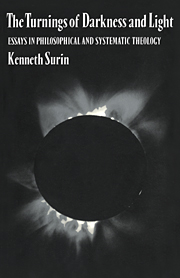Book contents
- Frontmatter
- Contents
- Dedication
- Preface
- Abbreviations
- 1 Creation, revelation and the analogy theory
- 2 The Trinity and philosophical reflection: a study of David Brown's The Divine Trinity
- 3 ‘Is it true what they say about “theological realism”?’
- 4 The impassibility of God and the problem of evil
- 5 Theodicy?
- 6 Tragedy and the soul's conquest of evil
- 7 Atonement and moral apocalypticism: William Styron's Sophie's Choice
- 8 Atonement and christology
- 9 Revelation, salvation, the uniqueness of Christ and other religions
- 10 ‘Many religions and the one true faith’: an examination of Lindbeck's chapter 3
- 11 Contemptus mundi and the disenchanted world: Bonhoeffer's ‘discipline of the secret’ and Adorno's ‘strategy of hibernation’
- 12 ‘The weight of weakness’: intratextuality and discipleship
- 13 ‘Theistic arguments’ and ‘rational theism’
- Notes
- Index of names
- Index of subjects
3 - ‘Is it true what they say about “theological realism”?’
Published online by Cambridge University Press: 19 January 2010
- Frontmatter
- Contents
- Dedication
- Preface
- Abbreviations
- 1 Creation, revelation and the analogy theory
- 2 The Trinity and philosophical reflection: a study of David Brown's The Divine Trinity
- 3 ‘Is it true what they say about “theological realism”?’
- 4 The impassibility of God and the problem of evil
- 5 Theodicy?
- 6 Tragedy and the soul's conquest of evil
- 7 Atonement and moral apocalypticism: William Styron's Sophie's Choice
- 8 Atonement and christology
- 9 Revelation, salvation, the uniqueness of Christ and other religions
- 10 ‘Many religions and the one true faith’: an examination of Lindbeck's chapter 3
- 11 Contemptus mundi and the disenchanted world: Bonhoeffer's ‘discipline of the secret’ and Adorno's ‘strategy of hibernation’
- 12 ‘The weight of weakness’: intratextuality and discipleship
- 13 ‘Theistic arguments’ and ‘rational theism’
- Notes
- Index of names
- Index of subjects
Summary
Some prolegomena
A central and recurring issue in the philosophy of religion (in its ‘Anglo-American’ manifestation at any rate) has been that of the proper from for a theory of meaning for theological (or ‘religious’) sentences or utterances. Around the time of the renowned symposium ‘Theology and Falsification’, and for a relatively brief period afterwards, discussions of this issue focused on the various ‘verificationist’ and ‘falsificationist’ frameworks for understanding language. Many leading philosophers of religion and theologians took with great seriousness the challenge issued by Antony Flew in his contribution to this symposium – viz. that the ‘believer’ does not use language assertorially in the religious context because she cannot specify what conceivable states of affairs would disconfirm (either in fact or in principle) what she says. As Basil Mitchell points out, Flew is in effect forcing a dilemma on the ‘believer’: either (a) theological languages are ‘meaningless’ because their sentences cannot be shown to be false; or (b) they are ‘meaningful’ but their sentences are in fact falsified. In dealing with Flew's dilemma, philosophers and theologians tended to adopt one or the other of two strategies.
There is a strategy which consists in the espousal of one of the several varieties of ‘non-cognitivism’. Thus it has been proposed that religious utterances be regarded as ‘bliks’ (R.M. Hare); as expressions of ‘behaviour policies’ (R. B. Braithwaite); as ‘stories’ (Paul van Buren); as ‘symbols’ (Paul Tillich); and, more recently, as expressions of ‘internalized spiritual principles’ (Don Cupitt).
[…]
- Type
- Chapter
- Information
- The Turnings of Darkness and LightEssays in Philosophical and Systematic Theology, pp. 41 - 56Publisher: Cambridge University PressPrint publication year: 1989



